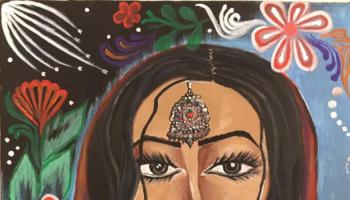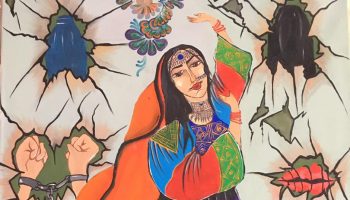Words by Anonymous
Art by Sama Harris
I never thought I’d fall in love. I genuinely thought that when I got older, I would have an arranged marriage out of convenience and have children together. There would be no passion or desire, but rather a simple life where my husband and I would be content. I never saw myself as someone who could be desired or be in a romantic relationship. I thought I was not designed for that exciting phase of life that everyone else gets to experience.
Then I met my current partner and everything that I believed wouldn’t happen, simply happened. He makes me feel beautiful, capable, and desired in a way I didn’t think was possible. Why didn’t I think it was possible in the first place though? Why couldn’t I be desired? What made me different from my friends or family? Nobody had ever explicitly said anything of the sort so why had I internalised this supposed truth?
I have been pondering these questions for months and although there aren’t definitive answers, it all boils down to the fact that I am a fat, female person of color. I cannot place sole blame for my issues on the facets of my identity, however, the harsh truth is that I have experienced life very differently because of my identity. The process of meeting and eventually dating my boyfriend has been a massive blessing, however, it has also helped me come to terms with the intersectionalities of my identity in ways that I am sure many women will be able to relate to.
I have become accustomed to feeling like an outsider and not belonging. I was born in India and lived there for two seconds before my family and I moved to Xi’an, China. After 2 years, we moved to Hong Kong for 14 years, then Singapore for another 6 years and now I am 20 years old and studying in Melbourne. That makes me a third-culture kid. As exotic and cosmopolitan as that seems, it was isolating. I looked and sounded different to everyone who was around me. This was further exacerbated by the fact that I spent my formative years in two countries that have been infamous for Chinese privilege. Essentially, my existence as an Indian was disorienting and uncomfortable for the mass majority.
Female third culture kids and immigrants have been known to experience exacerbated levels of “voicelessness” and silencing, simply because they are culturally homeless. Being transnational and female deeply impacts identity development because having to navigate cultural disassociation makes it easier for female experiences to be deemed invalid or unimportant. Additionally, being the only plus-size kid around further exacerbated my isolation. At times, I was able to identify explicit racism like when I was told to ‘go back to where I came from’. It took me much longer, however, to realise the impact subtle methods of exclusion had on my idea of love and self worth.
One of the few times I felt like I belonged in school was in Hong Kong with my friends. They made me feel at home in an environment which time and time again tried to remind me that I shouldn’t and couldn’t be made to feel at home. At times, they too had the unconscious biases and prejudices that I saw in everyone else. Whenever any of my friends would develop crushes, it was a giggly affair. “Oh my god, you have a chance with him!” or “Here’s how you should text him next”. It was endearing and sweet whenever my friends got crushes but it was different when it came to me. My friends were supportive but simultaneously, it was assumed that it would be unrealistic for my crush to develop into anything more. “Does it matter that he’s Chinese?”, “He kinda has a type though”. Things were going to be different for me because I looked different. I kept all my crushes to myself knowing that it was going to be unrealistic of me to want anything more.
As this continued to happen, I started to internalise many beliefs that I began understanding as fact, which I used as justification for completely closing myself off to any romance whatsoever. Nobody will like me because I’m fat, nobody will like me because I am Indian.
Fast forward to 2021, I’m starting my university degree online because of the pandemic and I am not able to meet people. I downloaded Hinge. What started as a joke ended up becoming the place I met the love of my life. I truly did not think anything would come of it.
Any time I talked to someone those same beliefs I had when I was younger came bubbling back up. “What if they don’t realise that I’m fat and then when they see me in person they will be disgusted.” When I first started talking to my current partner, I tried to be as clear and blunt as possible. “You do understand that I’m plus size, right?” When we started getting more serious, other insecurities started to shine through. “Are your friends and family going to be okay with me being Indian?” Although he actively reassured me and made me understand that I have nothing to be insecure about, my anxieties never left my mind.
After we eventually became official, I was happier than ever. He made me feel safe and secure. After the initial whirlwind excitement of being in my first relationship and meeting his family and friends, I remember distinctly catching up with an old middle school friend from Hong Kong after having moved to Melbourne. I was so excited to tell her about the new life I had made for myself and most importantly, that I had met someone! As I begin to tell her about him, they ask for a picture of the two of us. Of course, I happily oblige, looking forward to showing off my very cute pictures. “Oh my god, he’s handsome”, “I know right I’m so lucky!”.
It takes me a second to fully understand their initial reaction. What they said triggered an amalgamation of fears and insecurities to arise. People do care that I’m a bigger person with a skinner boyfriend, people do care that he’s White and I am Indian. This was not my friend’s intention but their genuine surprise that my boyfriend was attractive was an uncomfortable realisation.
Many similar comments were made throughout the beginning of my relationship. “Are you sure you want to wear Jhumka’s (dangly Indian earrings) to meet his family? You’re already going to be the only Indian, why do you want to make that obvious?” It became clear that my insecurities and anxieties didn’t just come out of nowhere. I had internalised people’s thoughts.
My relationship is still new and I am learning a lot about myself. The biggest thing I am beginning to realise is that beauty standards are way more powerful than I thought they were. People commonly think of issues like eating disorders when it comes to the topic of beauty standards. As much as I think that needs to be talked about more, I also believe that the more subtle consequences of beauty standards need to be addressed too. What I have come to realise is that beauty standards dictate the level of dignity you are given as a person, for example, fat-phobia dictates whether or not you can be thought of as someone who can love and be loved. Racism asserts that you should not express your identity and sexism dictates that you should care about these intersections because it will make you more attractive to the male gaze.
On the surface, it seems as though the best way to deal with the subsequent insecurities is to just not care about what people think. Every self-care Instagram post echoes this. “Live life on your terms”. Okay, but what if you don’t even realise that you’ve internalised damaging beliefs? How do you unlearn something you didn’t even realise was learned? I unfortunately still don’t have an answer. I don’t know if I ever will. The best I can do is surround myself with people who uplift and support me. I have to remind myself daily that my experiences are valid and it’s okay to have people remind me of the fact. I was not designed to be in the position I am in right now, happy and in love but that’s okay because I get to decide how I go about that now. My past experiences inform me rather than dictate how I go about my new relationships and life.



Word. Listening and giving voice to your inner narratives that need to be witnessed is a corrective experience in itself and healing. Enjoy your beautiful life journey! <3